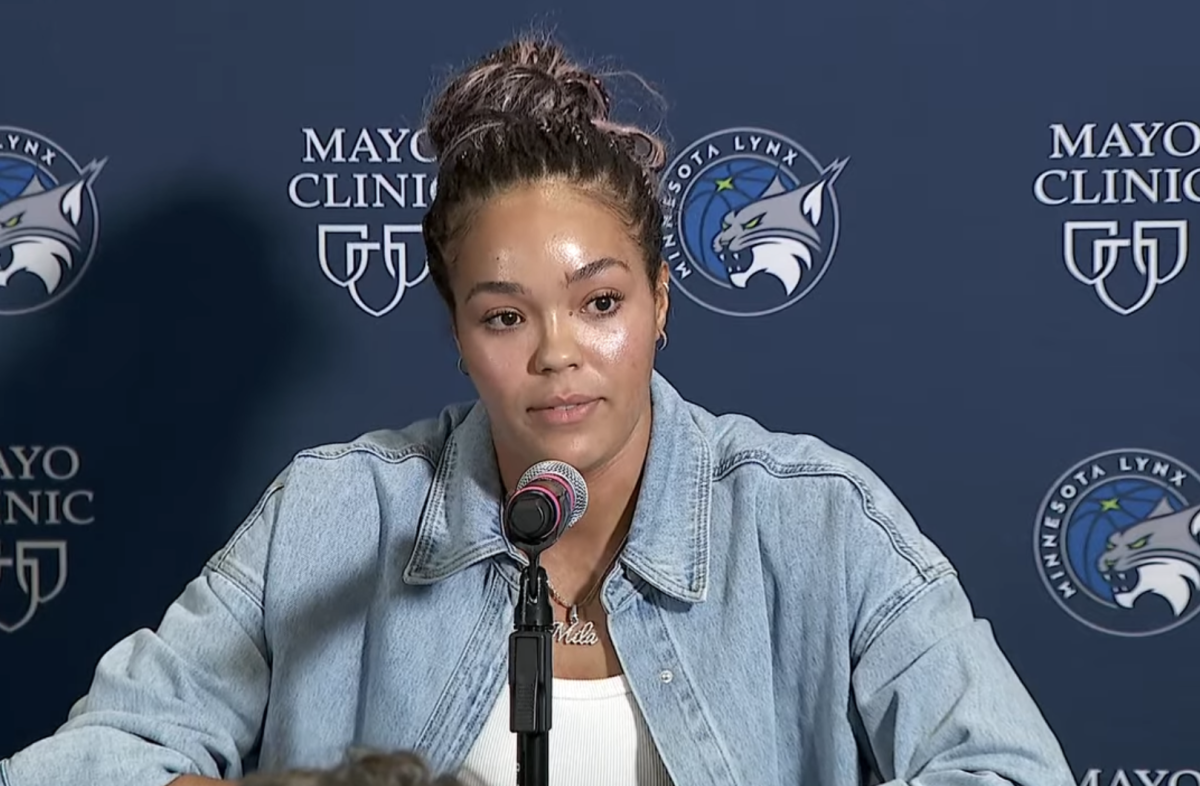Exit interviews are usually routine. A few reflections on the season, a nod to teammates, and a “we’ll be back next year.” But when Napheesa Collier sat down after the Minnesota Lynx were eliminated from the WNBA playoffs, she wasn’t interested in platitudes. Instead, she delivered a prepared four-minute statement that transformed a forgettable media availability into one of the most important soundbites of the year.
By preparing her remarks in advance and reading them in full, she ensured the story was about more than a single non-call or even her own injury. Collier shifted the focus to what she sees as systemic issues: inconsistent officiating, lack of accountability from league leadership, and undervaluing players who are fueling the WNBA’s current growth.
Calling out Commissioner Cathy Engelbert by name guaranteed headlines. Referring to league leadership as “the worst in the world” made it impossible for her message to be softened or ignored. In a press conference most players treat as an afterthought, Collier created a pivotal media moment.
One of the most strategic parts of her remarks came when she referenced some of the league’s most marketable stars such as Angel Reese, Paige Bueckers, and Caitlin Clark. Collier said Engelbert once told her Clark should be “grateful” for what she makes off the court because without the WNBA platform she “wouldn’t make anything.”
By focusing on Engelbert’s remarks about Clark, Napheesa Collier made sure her statement couldn’t be dismissed. Linking her critique to a name that grabs the attention of audiences beyond the WNBA’s followers, she was able to further elevate the reach of her message and secure national headlines.
Why the Timing Matters
Collier’s words didn’t land in a vacuum. They came after a controversial no-call that led to her ankle injury, on the heels of coach Cheryl Reeve being fined for criticizing officiating, and at a time when players across the league are openly voicing frustration with inconsistent refereeing.
But more importantly, Collier’s comments come as the WNBA and WNBPA actively negotiate a new collective bargaining agreement. Players have been applying pressure around CBA discussions, and Collier ensured the heat stayed on the WNBA.
Her statement was a public reminder to league leadership, fans, and sponsors that players are prepared to push for accountability, compensation, and protections in the next labor agreement. At the heart of those negotiations are player salaries and the distribution of league revenues. With a new media rights deal expected to triple league revenue, players are demanding a greater share of the pie.
Reactions Across the League
Collier’s words quickly rippled through the WNBA, with stars across teams validating her concerns and sharpening the criticism of league leadership.
Caitlin Clark said Collier’s statement had “a lot of very valid points” and pushed it further by calling this “the most important moment in the league’s history.” By backing Collier, Clark added weight to the CBA context and showed that younger stars are equally invested in systemic change.
A’ja Wilson said she was “honestly disgusted” by Engelbert’s comments, praising Collier as a leader in the players’ association and making clear she would “ride with Phee always.”
Sophie Cunningham went directly at Engelbert, calling her a “delusional leader” and defending Clark as central to the WNBA’s growth.
Angel Reese kept it short and sweet with a social media stamp of approval: “10/10. No notes!” — an online nod from one of the league’s most talked-about young stars.
10/10. No notes!
— Angel Reese (@Reese10Angel) September 30, 2025
The reactions underscored that Napheesa Collier wasn’t speaking for herself alone. Her words tapped into a wider frustration that cuts across teams, ages, and various levels of players.
Commissioner Engelbert later responded, saying she had the “utmost respect” for Collier and all players but was “disappointed in how her comments were framed,” calling them a “mischaracterization.” By then, however, the conversation had already shifted in the players’ direction.
Statement from #WNBA Commissioner Cathy Engelbert: https://t.co/atWKBPRSgi pic.twitter.com/I0Nq3ZAXsn
— Double Take Sports (@dbltakesports) September 30, 2025
What It Means Going Forward
Napheesa Collier, a vice president of the players’ union, understood that by controlling the message in a high-visibility moment, she could set the tone before negotiations officially begin. By the time the WNBA responded, the narrative had already been written by Collier herself.
Her move fits a growing pattern of athletes using media obligations as platforms for change. Naomi Osaka reframed press conferences around mental health. Angel Reese has consistently turned controversies into empowerment stories. LeBron James’ “More Than An Athlete” mantra became a movement because he owned the microphone at every turn.
Collier’s exit interview wasn’t just the end of the Lynx’s season. It was a carefully crafted moment that elevated the conversation from officiating gripes to the balance of power between the league and its players.
And with a new CBA looming, that balance may be up for renegotiation.
Sometimes the most powerful plays don’t happen on the court. They happen behind the mic.

